- Home
- E. M. Foner
Assisted Living Page 14
Assisted Living Read online
Page 14
The rest of the announcement was drowned out by the roar of the crowd and the thudding of spring-loaded seats folding themselves back into the closed position as everybody surged for the exits. It was a testament to the many years the Bitters had spent conducting evacuation drills from compromised domes that nobody got trampled in the mad rush.
“So, what did you and Flower have in mind for a storyline?” Lume asked the director. “How about something that starts with a rift in the space-time continuum that connects our galaxy with an evil mirror galaxy?”
“That’s been done a hundred times,” the bunny responded. “All we’ve decided so far is that we want a story compatible with showing off our production capabilities.”
“It’s my first time in the entertainment business and I don’t want to invest heavily on modeling interior scenes, so we’ll set the story on an unidentified Dollnick colony ship,” Flower announced. “In that sense, I’ll be standing in with the rest of you.”
“If you don’t even have the vague outline worked out, how can we stand in for characters this evening?” Harry asked.
“The first step in the production process is to release some stills showing off the chars and costumes so that the anime community will have something to speculate about.”
“Is this different than the guerilla marketing plan you told me about?” Bill asked, half raising his hand.
“It all fits together. Let’s get the promo shots out of the way. Director?”
“Everybody who knows how to guide a floating immersive camera, bring one out from backstage,” the Grenouthian director instructed. “We’ll position them around ourselves for full 3D capture to give the animators something they can flesh out.”
Harry followed the other aliens backstage to retrieve a camera, leaving Bill and Julie alone on the stage in the rapidly emptying theatre.
“You knew what this was about when we came in?” Bill asked.
“I met the guy who designed the Slomo char,” Julie replied. “Zick said that he’s a writer too, so maybe he’ll help with the story.”
“Do you think people will be able to recognize us after the animators turn us into cartoons?”
“Anime, and I hope not. Flower?”
“If the likeness makes you uncomfortable, you can always deny it,” the Dollnick AI said. “Besides, this could turn into your big break.”
“You mean we could have a career working as animation stand-ins?” Bill asked.
“It doesn’t pay that well. But as the director said, the anime community is very active, with fans from all of the species and amazing cosplay conventions. You know what? I think I’ll host one.”
“What’s cosplay?”
“Costume play. It’s performance art for fans.”
“Why would I want to go to a cosplay convention? I hate dressing up.”
“If my production does as well as I intend, being known as the stand-in for one of the chars could prove very lucrative, especially if the resemblance is apparent. Fans will pay to have their pictures taken with you.”
“I don’t know about this,” Julie said. “I’ve been famous once already for the wrong reason.”
“Move to the center of the stage,” the director instructed on his return. He had two floating immersive cameras under his control, yet was still able to gesture without crashing them. “The rest of you set the cameras on independent hover and I’ll handle the final placements.”
Harry and the group of alien spies joined Bill and Julie standing awkwardly at the center of the stage. The giant bunny moved rapidly around them, positioning the cameras and occasionally peering at the grouping over a furry thumb.
“Props are here,” Flower announced, and a pair of maintenance bots floated on stage with a large theatrical chest suspended between them. “Razood, you’re the weapons master so you hand out the prizes.”
The Frunge blacksmith flipped up the lid and immediately began tossing items over his shoulder without looking, though they all ended up on target. “Bill. Hard hat. Brynlan. Ninja costume, extra-large. Jorb. Hatchet. Hatchet. Hatchet. Hatchet,” he called, tossing the axes behind him. The Drazen martial artist reluctantly caught each one and kept them airborne in a glittering arc.
“I thought you couldn’t juggle,” Julie said.
“I don’t want to be known for playing a character called Juggler. There’s a difference.”
“Mine,” Razood declared, drawing out a hammer that must have weighed more than a small child. “Gerryman,” he continued, and turning his head, gently tossed Harry a wooden cane. “Going by the weight, I think it’s got a sword in it.”
“Where’s my weapons harness?” Avisia demanded.
“Kit for Battle Royale,” Razood said, pulling out the leather halter top with loops carrying all sorts of deadly-looking throwing weapons. He handed it to her and motioned for Julie to accompany him back to the chest. “I didn’t want to throw this either,” he said, offering her a glass coffeepot with an orange handle. “And here’s the tray.”
“Decaf?” she demanded incredulously. “Am I supposed to put my enemies to sleep?”
“And here’s your shovel at the bottom,” he said, drawing the tool out for Bill. “The folding chair must be for you, Lume.”
“Where’s my abacus?” the director demanded.
“Check the pocket under the lid,” Flower said. “I had to send a bot to borrow it from the Grenouthians with the bazaar booth, and they insisted I treat it like an antique.”
“Can you do something about the lighting, Flower?” the director requested. “Too many shadows.” He hopped around the group, in one case lowering his bulk to the floor to inspect everything from toe-top level, and finally entered the ring of cameras to join the others. “Small stand-ins to the front, large to the rear. Harry and Julie, you stand to either side of Lume.”
“He’s huge,” Harry pointed out.
“I’ll be sitting,” the Dollnick said, deploying his folding chair and assuming the four-armed thinker position.
“Harry, pull a little of that blade out of the cane, and Julie, bend your wrist like you’re throwing a pot of hot coffee in somebody’s face. Great overhead swing stance, Razood, and Jorb, grab one of those hatchets with your tentacle, will you? Choke up on the shovel, Bill, and everybody look fierce. Cameras on,” he issued the voice command.
“Perfect,” Flower said a minute later. “I can see it all coming together.”
“That’s a take,” the director concluded. “Those of you taking the theatre sport, if you see any of your other team members, tell them it’s on hold until Flower finds them a new director. This project is going to require all of my time.”
Thirteen
A young man with a yellow umbrella was waiting for the members of the independent living cooperative when they exited the shuttle. “Are you the group from Flower’s Paradise?” he inquired.
“Sixty-eight of us,” Jack replied. “Don’t let these two young ones throw you off.”
“I’m Dianne, from the Galactic Free Press,” the reporter identified herself. “I hitched a ride and I’ll be accompanying the group on their tour to write a story. I’m remaining on the ground after they return so I can work on some other articles.”
“You’re posted here?” the guide asked.
“Just until the ship is ready to leave.”
“Grab me at the end of the day and I’ll introduce you to the head archeologist from the human contingent,” the young man said. “And who are you?” he asked, turning to Julie.
“Refill,” the girl responded, striking her superhero pose with an imaginary tray and coffee pot. “Just kidding. I’m Julie and I’m here to carry things and run errands for the cooperative.”
“Great. So I’m Joab, and I’ll be taking you to the volunteer site. Our standard one-day program starts with some hands-on work at the dig, followed by lunch, and then there’s a three-hour walking tour. You’ve prepaid for the tour, but lunch is extra.”
“Are we working in the morning because it gets too hot in the afternoon?” Nancy asked.
“Our day here is a little over forty hours so we pretty much ignore the local clock,” Joab explained. “We used to start with the tour but we found that our visitors often looked disappointed when they boarded their shuttles to leave. Then we swapped the volunteer stint in the dig to the first half of the day and everybody seemed happier.”
“Is the work that hard?” Harry asked. “We’re no spring chickens, as you can see.”
“It’s mainly brushing ash away with a paintbrush,” the guide said, walking backwards towards the excavation site that stretched into the distance. “You have to go through a three-day training course before they’ll let you use a shovel, five days if you want to swing a pick.”
“Are they afraid of liability if volunteer workers hurt themselves?” Brenda asked.
“That happens all the time anyway when people dig by hand. The training is to protect buried artifacts and structures,” Joab said, then launched into a prepared speech. “The first step for an archeological dig is to survey the target area with ground-penetrating radar, sonar, and a few alien imaging techniques that I don’t really understand. This gives the archeologists a pretty detailed map of what we’re going to find, but you need training in reading the three-dimensional maps accurately before anybody is going to let you go at it with a trowel, much less a shovel.”
“So you’re saying there’s about zero chance that we’ll be making any discoveries?” Irene asked, keeping the floating camera she was operating focused on the young guide.
“Sometimes small items slip by the imaging screens. For example, coins and personal ornamentation can be difficult to differentiate from certain types of small rocks or naturally occurring nuggets. When I take you for lunch at the visitor center, you’ll see a display of artifacts that tourists have uncovered. It’s just not very likely.”
“You mean if I find something valuable I won’t get to keep it?” Tom demanded. “I worked in recycling most of my career, and it was industry standard practice to let the workers retain any coins or jewelry we found in the cushions of old acceleration couches.”
“You’ll have to complain to the Stryx, they’re the ones who make the rules here,” Joab said. “After the initial survey is complete, we set up a grid with string that can be referenced to a fixed point, so we can accurately establish the original location of any artifacts that we remove. It’s safety string that will break before it trips you, but we’d prefer if you didn’t test it. Once the grids are established, the trained excavators dig test pits with picks and shovels, and we sift through all of the removed material, a job that some of you will be assigned this morning. Then the archeologists select areas from the imaging that they want fully exposed, and when the trowel crew reaches any of the target objects, they call in the brush crew to remove the rest of the overlay.”
“You’re saying you dig out items by whisking away the dirt?” Harry asked. “That could take days.”
“It’s compacted ash, not dirt, and it usually takes an hour or so unless you’re talking about something really large. You can use the dumb end of the paintbrush to dig a little, but if you get caught really jabbing it in, the grid supervisor will move you to work sifting.”
“You’ve mentioned ash a couple of times,” Nancy said. “Was this site buried by an ancient volcanic eruption like Pompeii?”
“Is that one of those Verlock worlds where they misjudged the volcanic activity?” Joab asked, still walking backwards.
“No, it’s a city on Earth that was buried in the times of the Roman Empire.”
The former school teacher’s answer finally brought Joab to a temporary halt. “Are you talking about the aliens from one of those ancient SciFi series my dad watches?”
“The Romans were—”
“I remember now,” Joab cut her off, resuming his backwards walk. “My mom made me memorize all the important stuff from Earth’s history. The Romans came between the Greeks and the Mongols, right?”
“That’s accurate as far as it goes, but they were hardly the only civilizations.”
“I mainly liked the military empires. Anyway, if, uh, Pompeii had been anything like this place, humanity would have been extinct before the Stryx opened Earth.”
“Is that what happened here?” Dianne asked.
“Around a million years ago,” the guide continued. “This world got the double-whammy, and there’s a big round ocean where most of the water ended up when it was all over. After the asteroid strike, the planet went into a long phase of hyper-volcanic activity, and everything that hadn’t already been wiped out got buried in ash.”
“But it looks so green,” Irene said.
“The plants are the first to come back,” Joab said. “Seeds and microbes are pretty tough, but none of the big land fauna made it, and the ocean isn’t exactly teeming with life either.” He came to a halt right before his heel reached the grid string at the edge of the excavation. “The poor aliens who lived here were barely into their iron age when it happened, but there were a lot of them, and they were great at building with stone. The Stryx declared the world a Galactic Heritage site, and they only opened it to excavation a decade ago. There are around two million people employed on the planet, which is how we got into CoSHC. More than half of us work on the dig, and there are also around a thousand aliens, but almost all of them are scientists or students.”
“How long have you been here?”
“Since the beginning. My parents brought me here when I was eleven.” Joab reached in his shoulder pouch and pulled out a handful of what looked like artist’s brushes. “Now who wants to work squatting or kneeling, and who wants to sift through the excavated material?”
Nearly three hours had passed with nobody discovering anything more exciting than shards of pottery, when Maureen, who had been cleaning off the remains of a stone hearth with a paintbrush, cried out, “Over here. I think I found something.”
Joab was the first one to arrive and he immediately spotted the glint of gold she had uncovered. He used his own paintbrush to clear a little more of the ash away and then utilized his tab to take a still image of the small coin before lifting it out with the blunt end of his brush.
“Congratulations,” the young guide said. “You’re the first tourist this month to find a coin.”
“It’s so thin,” Maureen marveled.
“Is gold common on this world?” Tom asked.
“No more so than on Earth,” Joab said. “If you’re wondering how gold coins could end up lying around like that, I’ve got two explanations. First, most of the stone structures on this world were knocked flat in the asteroid impact and the quakes that followed. Second, enough microbes and bacteria survived and adapted to break down the organics that were buried in the ash, but the gold wasn’t affected.”
“Could you put the coin back for a minute and let Maureen find it again?” Irene asked. “It would make a great scene for our promo.”
Joab smiled at the request, and he skillfully reburied the coin, brushing a little ash over the top. “Go for it,” he told Maureen. “Just don’t mention this to anybody at the gift shop. In addition to selling replica coins, they have a little studio with a fake excavation set up so you can record your find and fool your friends.”
“Why would anybody want to do that?” Irene asked as the first glint of gold appeared on the camera’s viewfinder screen.
“I’ve never been a tourist so I couldn’t say. Are you all ready for lunch?”
Although the weather was temperate, and Julie had done her job bringing around water to make sure the cooperative members stayed hydrated, everybody had had enough of sifting or brushing ash by that point. Joab led them to the visitor center, opening his yellow umbrella along the way.
“Remember, yellow,” he told them. “I’m going to eat with the other guides, but I’ll be back in forty-five minutes.”
Jack care
fully climbed onto a stone bench at the entry to the visitor center and let out a shrill whistle to get everybody’s attention. “We made a deal in advance with the cafeteria management for a group discount, and Julie is going to get our vouchers. You can get in line now, and she’ll come around and give everybody their chit before you reach the checkout. We only have forty-five minutes before the walking tour starts, so please don’t wander off after you eat.”
There were still plenty of open tables when the cooperative members began looking for seats, and they ended up arranging themselves in their traditional lunch groupings.
“It’s easy to forget how good we have it on Flower,” Nancy said, moving aside a leaf of limp lettuce to reveal a mealy slice of tomato. “We should have taken her up on her offer to send a picnic lunch for two creds a head.”
“Places like this don’t like it if you bring your own food,” Jack pointed out. “Besides, it’s for a good cause.”
“Do you think the profits go to the preservation work?”
“I read the health certificate while we were waiting in line, and the cafeteria is managed by a business that won an auction for a five-year contract. But the cafeteria’s profitability establishes the auction price, and that money does go to the Stryx for running the dig.”
“I’ll eat that salad if you don’t want it,” Dave volunteered.
“Why didn’t you get soup or a sandwich?” Nancy asked.
“I don’t want to blow my diet. I’m trying to earn back my ice cream privilege.”
“I think I saw a compost bin outside,” Harry said. “I’m not one to waste food, but this quiche is only fit for recycling.”
“Have my half-sandwich,” Irene offered, pushing her plate to her husband. “The soup already ruined my appetite.”
“We really are spoiled,” Jack said. “The only thing wrong with this food is that it’s average.”
“I’d rather browse through the displays before the tour starts,” Harry said. But he took his wife up on her offer to eat the diagonally sliced half of a cheese sandwich on wheat. “Edible,” he muttered. “Barely.”

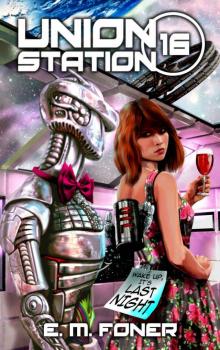 Last Night on Union Station (EarthCent Ambassador Book 16)
Last Night on Union Station (EarthCent Ambassador Book 16)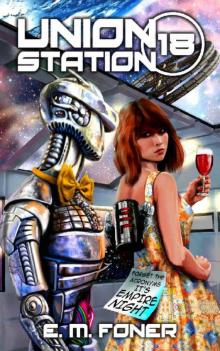 Empire Night on Union Station (EarthCent Ambassador Book 18)
Empire Night on Union Station (EarthCent Ambassador Book 18)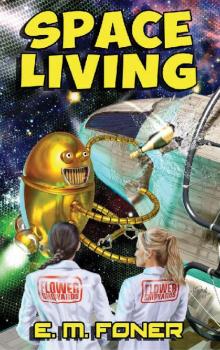 Space Living (EarthCent Universe Book 4)
Space Living (EarthCent Universe Book 4)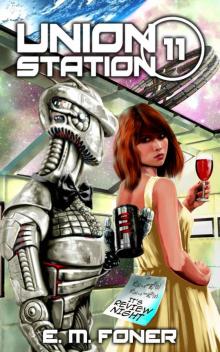 Review Night on Union Station (EarthCent Ambassador Book 11)
Review Night on Union Station (EarthCent Ambassador Book 11)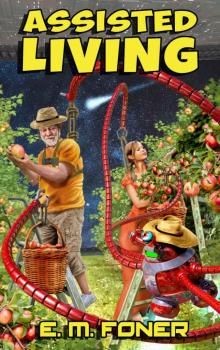 Assisted Living
Assisted Living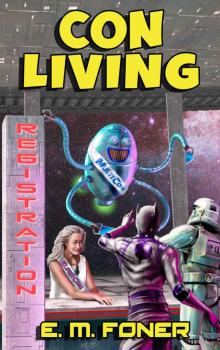 Con Living
Con Living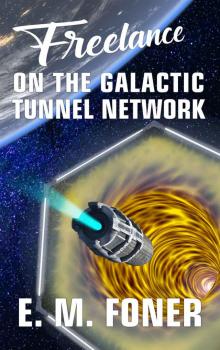 Freelance On The Galactic Tunnel Network
Freelance On The Galactic Tunnel Network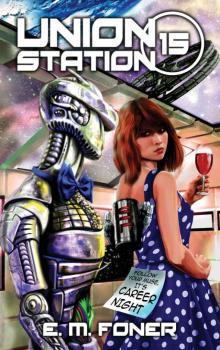 Career Night on Union Station
Career Night on Union Station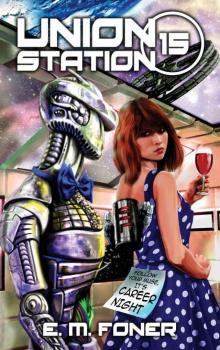 Career Night on Union Station (EarthCent Ambassador Book 15)
Career Night on Union Station (EarthCent Ambassador Book 15)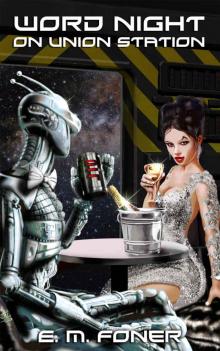 Word Night on Union Station (EarthCent Ambassador Book 9)
Word Night on Union Station (EarthCent Ambassador Book 9)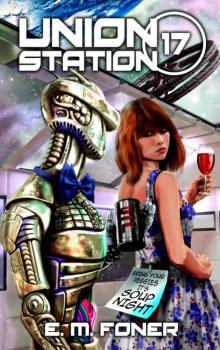 Soup Night on Union Station
Soup Night on Union Station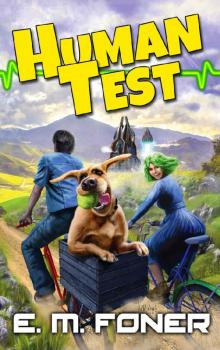 Human Test
Human Test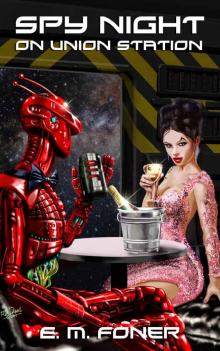 Spy Night on Union Station (EarthCent Ambassador Book 4)
Spy Night on Union Station (EarthCent Ambassador Book 4)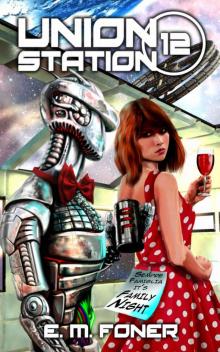 Family Night on Union Station (EarthCent Ambassador Book 12)
Family Night on Union Station (EarthCent Ambassador Book 12)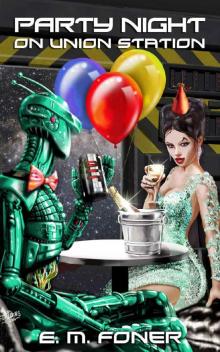 Party Night on Union Station (EarthCent Ambassador Book 10)
Party Night on Union Station (EarthCent Ambassador Book 10)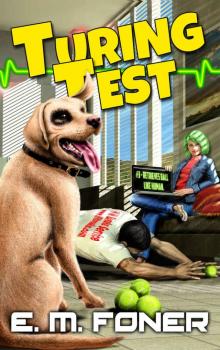 Turing Test
Turing Test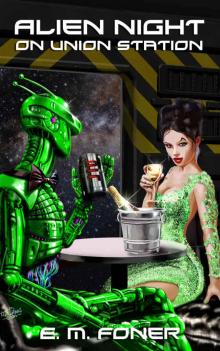 Alien Night on Union Station (EarthCent Ambassador Book 2)
Alien Night on Union Station (EarthCent Ambassador Book 2)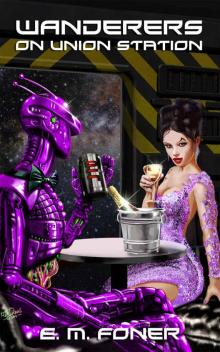 Wanderers On Union Station (EarthCent Ambassador Book 6)
Wanderers On Union Station (EarthCent Ambassador Book 6)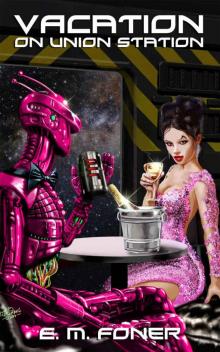 Vacation on Union Station (EarthCent Ambassador Book 7)
Vacation on Union Station (EarthCent Ambassador Book 7)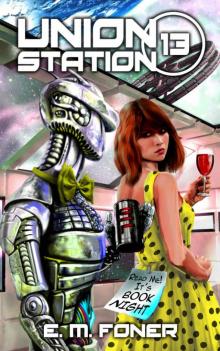 Book Night on Union Station (EarthCent Ambassasor 13)
Book Night on Union Station (EarthCent Ambassasor 13)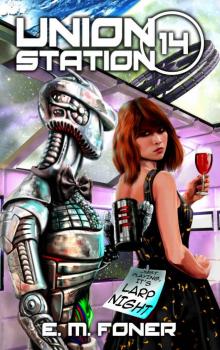 LARP Night on Union Station
LARP Night on Union Station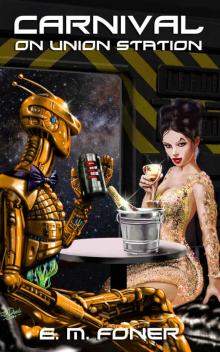 Carnival On Union Station (EarthCent Ambassador Book 5)
Carnival On Union Station (EarthCent Ambassador Book 5)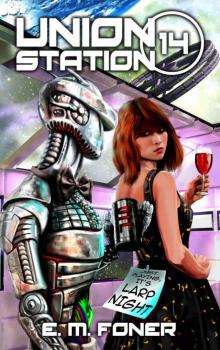 LARP Night on Union Station (EarthCent Ambassador Book 14)
LARP Night on Union Station (EarthCent Ambassador Book 14)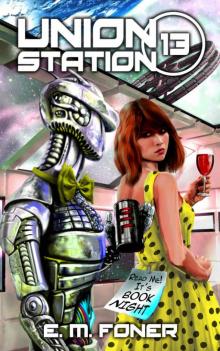 Book Night on Union Station
Book Night on Union Station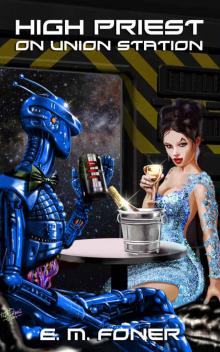 High Priest on Union Station (EarthCent Ambassador Book 3)
High Priest on Union Station (EarthCent Ambassador Book 3)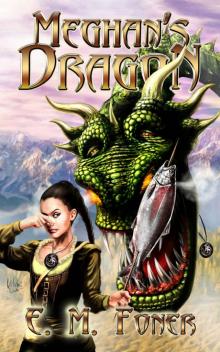 Meghan's Dragon
Meghan's Dragon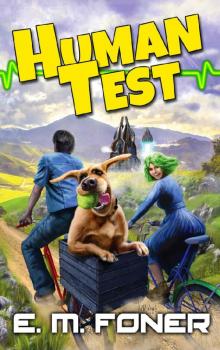 Human Test (AI Diaries Book 2)
Human Test (AI Diaries Book 2)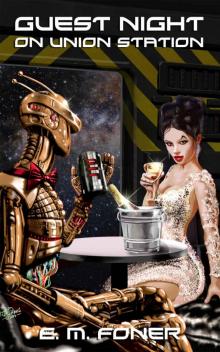 Guest Night on Union Station
Guest Night on Union Station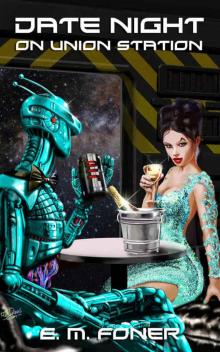 Date Night on Union Station
Date Night on Union Station